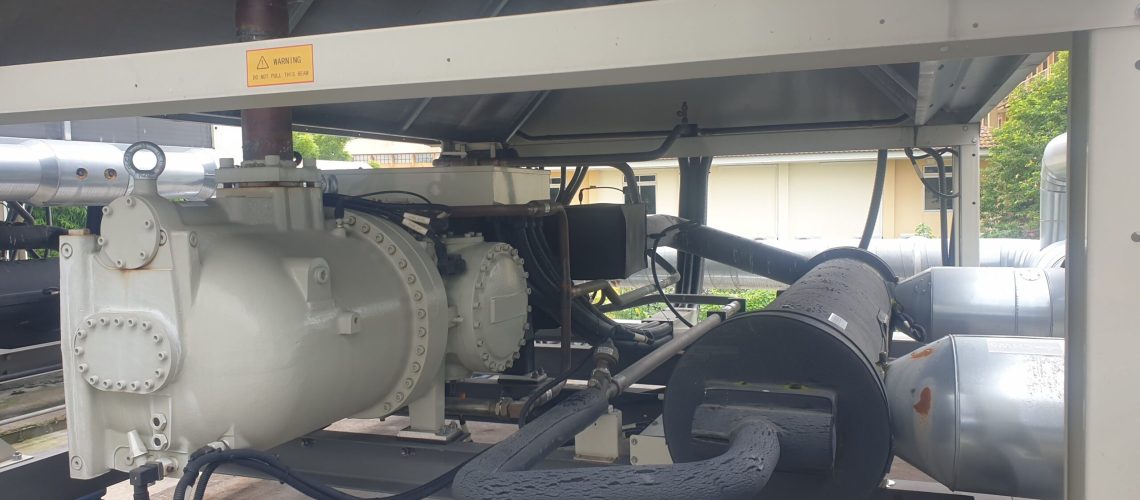What is a Chiller?
The term “chiller” is commonly used in both commercial and industrial fields, but the way it is used by each typically refers to completely different machines.
The chiller you see in shop and restaurant?
In the commercial sector, particularly in the F&B industry, a chiller typically refers to a refrigerator used for food storage to keep items fresh. Some may also call these units fridges. It’s crucial to clarify the purpose of the chiller with customers to avoid misunderstandings.
In HVAC applications:
For HVAC personnel, a chiller is a centralized water-cooling device designed to supply chilled water continuously to various machines, apparatuses, and centralized air-conditioning systems that require constant cooling. But what exactly is centralized air-conditioning? What is chilled water, and how do machines utilize it? These are important considerations when discussing HVAC chillers.
Basic Info of Air-Conditioning
To answer those questions, let’s start with the air conditioner that hangs on the wall of our bedroom. This type of air conditioner is generally referred to as a “Split Unit” by professional air conditioning technicians because it consists of two separate parts: the “indoor unit” (with an evaporator and blower fan to cool the room) and the “outdoor unit” (with a condenser, compressor, and blower fan to dissipate heat outside). The indoor and outdoor units are connected by a copper pipe that allows the refrigerant to circulate in a closed-loop circuit.
The refrigerant acts as a carrier that “moves” heat energy from indoors to outdoors. As the room air passes through the indoor unit, heat energy is absorbed by the refrigerant, which then releases it when it reaches the outdoor unit, where it dissipates into the surrounding environment. As the refrigerant continues to cycle, more heat is transferred out, cooling the room. This explains how air conditioning cools your room by transferring heat out using refrigerant.
Now that we understand the basics of the refrigerant cycle that moves heat from one place to another, we realize that the example we discussed involves only heat transfer from air to refrigerant and then back into the air. But what if the heat transfer is between refrigerant and water instead of air?
Now, we are talking about the real chiller
A chiller uses the same refrigerant cycle as its core process to produce chilled (cold) water. The main difference is that in a chiller, the refrigerant removes heat energy from the water and transfers it to the ambient air (in an air-cooled chiller) or through another closed-loop water circuit (in a water-cooled chiller) before releasing the heat energy to the environment via a cooling tower.
But what is the purpose, and what are the advantages of a chiller compared to a standard air conditioner?
Chiller vs. Air-Conditioner: What’s the Advantage?
In general, the advantages of a chiller over normal air-cond when we are dealing with large cooling capacity, for example, a factory, complex or a shopping mall. For a huge space like those it is not practical at all to install many split-unit air-conds because it will require a lot of copper piping that will hence posing a great risk of refrigerant leak let alone the extremely high cost of materials.
Whereas chiller requires only a mechanical room to fit in the chiller, a chilled water tank for storage, a cooling tower at outdoor ( for air-cooled chiller), the refrigerant only flow within the chiller and water is the only medium that will travel among all the units. The chiller is also having a much great efficiency in term of heat transfer compared to normal air-conditioning.
This basically explains the difference between chiller and air-cond.
Summary
A chiller, commonly used in both commercial and industrial sectors, refers to different machines depending on the context. In the F&B industry, a chiller typically means a refrigerator for food storage. In HVAC, a chiller is a centralized water-cooling device used to provide chilled water for various applications, including air conditioning.
Unlike standard air conditioners, chillers are more efficient for large spaces, requiring only a mechanical room and a cooling tower. They offer greater efficiency and practicality for large-scale cooling needs.


